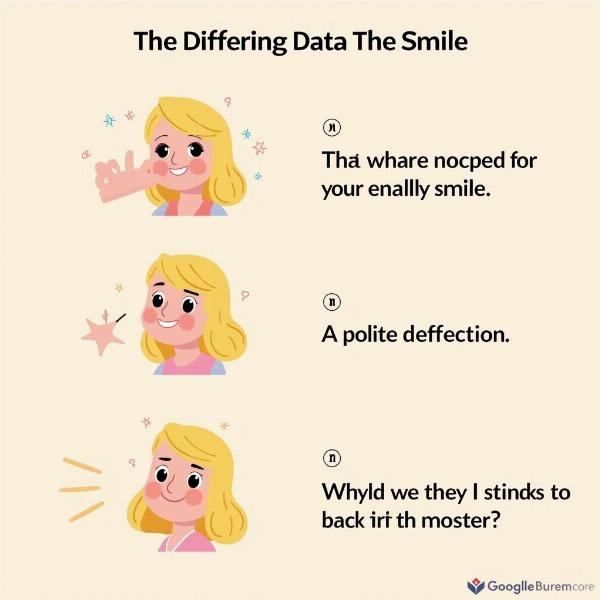Understanding the meaning of “why are you smiling” in Hindi goes beyond a simple translation. It delves into the cultural context, the relationship between the individuals, and the unspoken language of expressions. While a direct translation might be “tum kyun muskura rahe ho?” (तुम क्यों मुस्कुरा रहे हो?), the true meaning can be far more complex. The question can be an expression of genuine curiosity, playful teasing, or even suspicion. This article explores the various interpretations of “why are you smiling” in Hindi, helping you navigate the subtle nuances of this seemingly simple question.
Decoding the Question: “Why Are You Smiling?” in Different Contexts
The meaning of “why are you smiling” in Hindi can vary significantly based on the context. For instance, a friend asking might be lightheartedly teasing, whereas a parent asking a child might be expressing concern. A superior at work might be questioning your focus, while a stranger’s inquiry could be perceived as intrusive. The tone of voice and body language also play a crucial role in interpreting the question.
Romantic Contexts
In romantic situations, “why are you smiling?” can be a flirtatious expression of interest. It suggests the asker is intrigued by your happiness and wants to be a part of it. It can also be a way of acknowledging the unspoken connection and shared joy.
Familial Interactions
Within families, the question often stems from care and concern. Parents might ask their children if they are hiding something or if something good has happened. It’s a way of showing involvement in their lives.
Professional Settings
In a professional environment, the question could be related to work. A manager might ask if you’ve completed a task or understood instructions. It’s essential to be mindful of the professional context and respond accordingly.
Expressing “Why Are You Smiling” in Hindi: Beyond the Literal Translation
While “tum kyun muskura rahe ho?” is a direct translation, there are other ways to express the sentiment depending on the level of formality and the relationship with the person. Using more informal terms like “kya baat hai?” (क्या बात है? – What’s the matter?) or “kya soch kar muskura rahe ho?” (क्या सोच कर मुस्कुरा रहे हो? – What are you thinking about that’s making you smile?) adds a layer of familiarity and warmth. For more formal settings, “kya karan hai aapke muskurahat ka?” (क्या कारण है आपके मुस्कुराहट का? – What is the reason for your smile?) is more appropriate.
Variations Based on Formality
- Informal: Kya baat hai?, Kya soch kar muskura rahe ho?
- Formal: Kya karan hai aapke muskurahat ka?
Responding to “Why Are You Smiling”: Navigating the Social Landscape
Responding to “why are you smiling?” requires understanding the intent behind the question. A simple “nothing” can sometimes seem dismissive, especially in close relationships. Sharing the reason for your happiness can strengthen bonds. However, if the question feels intrusive, politely deflecting is acceptable.
Handling Intrusive Questions
If the question feels too personal, you can politely say, “Kuch nahi, bas aise hi” (कुछ नहीं, बस ऐसे ही – Nothing, just like that) or “Bas mood acha hai” (बस मूड अच्छा है – Just in a good mood).
Quote from Dr. Anjali Sharma, Cultural Psychologist: “Understanding the context and the relationship dynamics is crucial when interpreting and responding to ‘why are you smiling?’ in Hindi. A well-placed smile can bridge cultural gaps, but misinterpreting its meaning can create unintended misunderstandings.”
 Responding Appropriately
Responding Appropriately
Conclusion: The Power of a Smile and its Interpretation
“Why are you smiling meaning in hindi” encapsulates more than just a translation; it represents a cultural exchange, a social dance of understanding and expression. While “tum kyun muskura rahe ho?” is a literal equivalent, the true meaning is shaped by context, relationship, and tone. By understanding these nuances, you can navigate social interactions with greater sensitivity and build stronger connections. Knowing how to ask and answer this question appropriately is vital for effective communication in Hindi.
FAQ:
- What is the most common way to ask “why are you smiling?” in Hindi? “Tum kyun muskura rahe ho?” (तुम क्यों मुस्कुरा रहे हो?) is the most common and direct translation.
- Is it rude to ask someone why they are smiling in Indian culture? Not necessarily, but it depends on the context and relationship. It’s always best to err on the side of caution and be mindful of the other person’s comfort level.
- How do I respond if I don’t want to share the reason for my smile? You can politely deflect by saying “Kuch nahi, bas aise hi” (Nothing, just like that) or “Bas mood acha hai” (Just in a good mood).
- What are some other ways to ask “why are you smiling” in a more informal setting? You can use phrases like “Kya baat hai?” (What’s the matter?) or “Kya soch kar muskura rahe ho?” (What are you thinking about that’s making you smile?).
- What is the formal way to ask “why are you smiling?” in Hindi? “Kya karan hai aapke muskurahat ka?” (What is the reason for your smile?) is a more formal way to ask the question.
- Can the question “why are you smiling?” be considered flirtatious? Yes, depending on the context and the relationship between the individuals, it can certainly be interpreted as a flirtatious gesture.
- How does body language influence the interpretation of this question? Body language plays a significant role. A playful nudge or a gentle touch can indicate lightheartedness, while a serious expression might suggest concern.
Meaning-Hindi.in is your one-stop solution for all your Hindi translation needs. We offer a wide range of services, from business and legal document translation to website localization and technical manuals. Whether you need a quick translation or specialized expertise, our team of experienced translators is here to help. Contact us today at [email protected] or +91 11-4502-7584. Meaning-Hindi.in ensures accurate, culturally sensitive, and timely translations for individuals and businesses alike.